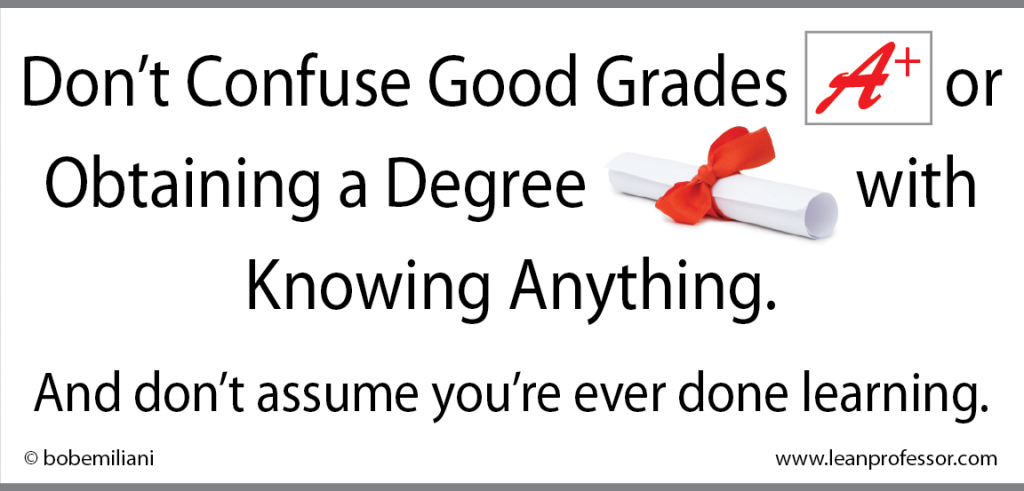A common benefit cited for MOOCs is that short videos combined with frequent quizzes, synchronous with learning, emulates one-on-one tutoring or self-paced learning. This allows the student to gain “mastery” of one lesson before moving onto the next, and apparently leads to better exam scores and pass rates (no surprise there). The practice that students engage in is said to improve long-term retention of the information.
This sounds to me like another way to “teach to the test” and a continued focus on teaching for the short-term. I am skeptical that most students would view this in any way other than as a hurdle to overcome on the way to graduation, not as a means to gain “mastery” (which is a false hope that educators should never offer). In addition, as I watch the periodic financial crises and other big problems that occur in society, I know that these problems were most often created by people who had very high grade point averages (tested well in the short-term), but yet were unable to retrieve the most fundamental thing they were taught in school: critical thinking. Retention for the long-term seems to be missing.
As a self-taught (electric) bass player, I have learned that effective self-paced learning requires far more than a single video lesson or a semester’s worth of practice to claim “mastery.” The amount of practice that it takes to play an instrument well enough to enjoy playing it (and for others to want to hear it) is enormous – some 10,000 hours to gain basic “mastery.” More time is needed in order to understand and be able to consistently execute nuances and small details in music.
In contrast, consider a 120 credit (40 course) undergraduate educational experience, which consists of about 1600 contact hours with faculty and perhaps 4800 hours of homework assignments (40 hours per week x 30 weeks per year x 4 years). The 6400 hours appears to be, in most cases, insufficient to teach students how to think critically (assuming zero fluff courses, no shortcuts taken to avoid critical thinking, and no memory loss due to excessive alcohol consumption). In a typical undergraduate educational experience, only a small portion of that time is used towards developing critical thinking skills. Most students need far more practice to learn how to think critically.
Since having been first exposed to Lean thinking in 1994, I know that it has taken me far in excess of 10,000 hours to learn how to think critically, and that I have to practice critical thinking every day. My university teachers (combined BS, MS, and PhD) simply got me started; they helped me get to step 4 or 5 on a hundred-plus step journey. I had to do the rest myself.
As a result, I try teach my students for the long-term. I say “try” because this is an ongoing experiment and I do not know how successful I am and I may never know. But I do know that in most of the courses I teach, a common student reaction is that they see things completely differently after the course compared to before, and that many seem to retain the learning over time (10 to 12 years, thus far). So, perhaps I have helped them get to step 15 or 16. They have to do the rest themselves.
Most professors vastly overestimate the effectiveness of their ability to teach students how to think critically (and, relatedly, how to do research). They also overestimate what they are able to achieve in terms of the long-term impact that teaching critical thinking (and research) has on most students (as well as its relevance outside of an academic setting). And most students vastly overestimate their understanding and ability to apply critical thinking and do research based on their undergraduate educational experience. Formal education means little if students do not practice what they have learned after graduation and especially on-the-job.
Can MOOCs (and their variants) improve this situation? Perhaps, but I am doubtful because “mastery” is not the result of a single video lesson or a semester’s worth of practice. “Mastery” is the product of long-term practice. To indicate otherwise to students is false and misleading, and makes students think they are much smarter than they actually are. As a result, graduates will be more problem-creator than problem-solver (or, better yet, problem-avoider).
This is what I tell my students on the first day of class in every course that I teach:

